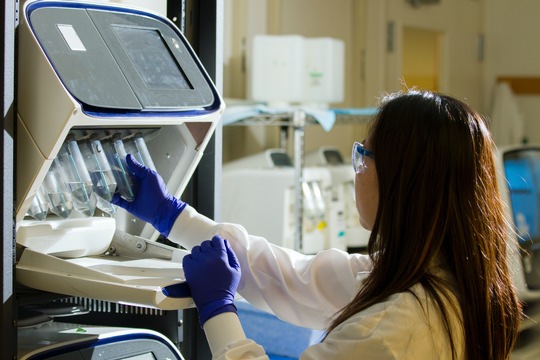I am looking for information as
Researcher

Industry

Patient

canSERV Open Call Invites Cancer Researchers to Apply for Free State of the Art Services and Training
European wide research infrastructures offer a portfolio of services to address the needs of the entire oncological research pipeline
As part of a concerted strategy to tackle the challenges of cancer, the EU-funded project canSERV offers more than 400 innovative cancer research technologies to European and non-European cancer researchers at all levels. The service, or a combination of services and training, can be requested to accelerate ground-breaking discoveries and their translation into clinical applications.
In line with Europe’s Cancer Mission and Beating Cancer Plan, canSERV promotes the development of concrete solutions for cancer by providing a comprehensive set of world-class oncology technologies and state of the art training to cancer scientists.
canSERV Enables Researchers to Cover the Entire Range of the Oncology Developmental Pipeline
Following the success of the previous Challenge-Call on “Advancing Personalised Oncology”, canSERV now invites applications covering the entire range of the oncology developmental pipeline; supporting discoveries in fundamental research to translational science and personalised oncology.
canSERV welcomes excellent research applications addressing at least one of the four strategic goals of the Cancer Mission:
- Understanding of Cancer
- Prevention and Early Detection
- Diagnosis and treatment
- Quality of life for patients and their families
Researchers from academia, industry and SMEs may apply for several services including: i) disease models, ii) cutting-edge imaging and structural biology technologies, iii) biomarker research and development, iv) new therapeutic solutions, v) complex clinical trial design and support, vi) personalised oncology implementation pipelines and recommendations and vii) regulatory support and tools to analyse the socioeconomic dimension of research activities.
Launch of the call 12 October 2023.
Submission deadline is 4 January 2024, 2pm CET.
Full call text can be accessed as a PDF.
The applications will be reviewed by an international, independent review panel!
The tentative budget for this first call is 1.0 Mio. EURO. For more information and the call text, please visit our CanSERV project website: www.canSERV.eu/Calls
Further information:
canSERV website: www.canserv.eu
Twitter: @canSERV_EU
LinkedIn: canSERV
Project coordination, BBMRI-ERIC:
Prof. Jens K. Habermann, Director General
Judit Balogh, Senior Project Manager
This project has received funding from the European Union’s Horizon Europe research and innovation programme under grant agreement number 101058620.






